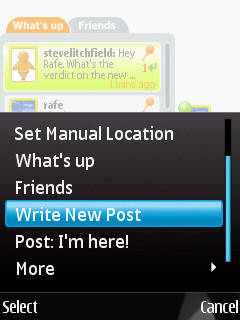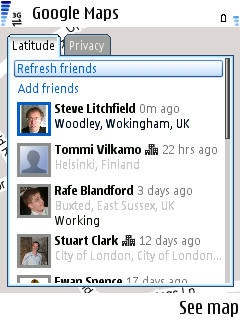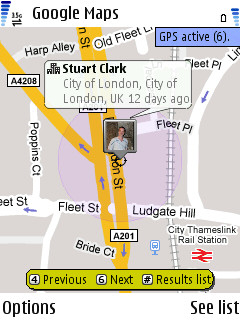Maybe it's simply that I've lost my wife too many times in town. Or maybe it's the sheer geek coolness of it all. But when the new breed of mobile-friendly, location-aware social (mo-lo-so) networks arrived (the highest profile of which is Google Latitude), I got very excited indeed. Integrating your contacts list with your (and their) whereabouts, mapped neatly on-screen, along with an almost-real-time communication channel? What's not to like?
Nokia (Chat/Ovi Contacts) and Yahoo (Fire Eagle)'s attempts at achieving this geek nirvana could perhaps be dismissed on the grounds that only geeks will have got to know about them - and the one thing that each of these services has in common is that it has to go mainstream, to the extent that a significant number of your friends and family are also logged in and tracked. Yet even the mighty, all-conquering Google has so far failed to attract the slightest mainstream attention (aside from sensationalist articles in some papers decrying it for invasion of privacy). If these services really are the Holy Grail of mobile communication then shouldn't they be taking off? Even a tiny bit?


Nokia's Friendview system...
The central thrust of a mo-lo-so network, as evidenced by the typical promo video, is that your friends need to know where you are. For example, the most common scenario quoted is that of a young professional posting "Anyone up for lunch?", with Latitude (or similar) automatically assigning their whereabouts. The idea then is that his or her friends are also plugged into the same location-based social network and are monitoring it closely enough to notice (in the hour or so between the post and the hypothetical lunch) the question and can then respond directly.
It's a nice, clear example of how such a network might work, but it's beset with caveats. The obvious ones are that your contacts all need to have heard of and then subscribed to the same network and that they then need to have been monitoring their friends' statuses on a many-times-per-day basis. Which, in itself, isn't totally unlikely, especially in certain demographics.
The biggest problem is that last word: demographics. I'm sure there are some students and young professionals living in an urban environment, with lives of sufficient flexibility that they have the luxury of actively monitoring what their friends are up to and then suggesting and then attending an unscheduled meet-up.

Back in the real world, or at least back in wider demographics, most of us are constrained by some sort of routine. For myself, for example, there's the school run (dropping kids off at school), followed by office work, followed by another school run and then some more work. The times and locations are rigidly fixed and there's little I can do about them. You'll have your own daily and weekly routines, in terms of time and location, and the chances are that for roughly 48 weeks of each year you adhere to them equally rigidly.
Which means that if a family member or friend wants to catch you 'for lunch', they'll already know exactly where you are to within about 98% probability. And for the other 2%, what's wrong with a low-tech phone call or SMS?
Mulling over my thoughts for this piece, I was struck by a diagram here (copied below and backed up by a feature with many parallels to this one), attempting to show that your actual whereabouts right now is of interest to very few people, whereas where you'll be in the future is of much higher interest, in terms of scheduling meet-ups, with the credibility of your current location only really valid for a handful of minutes in terms of an ad-hoc person-to-person meet.
What's potentially more useful are ways of integrating your Calendar with your actual location, with your phone alerting you if you're not in the right place at an appointed time and with others being able to respond to automated alerts along the lines of 'your friend XXX is currently in Brixton but will be attending a meeting 200m away from your position in two hours time - would you like to send a casual meet invitation? - Yes/No'. And so on. In this sense, the diagram above does make a good point.
Nokia Chat has been the best implemented system I've seen so far, in terms of likelihood of mass market adoption, in that it sits alongside Contacts, surely the core function on any phone or smartphone. You have people listed in Contacts? Why not start chatting to them and exchanging locations if needed? It remains to be seen how Nokia plan to finally implement mo-lo-so in upcoming phones, but with their numbers, whatever solution they end up with stands a chance of achieving traction.
Empirically, I started out on my Latitude journey in the same way as I started out with Nokia Chat and Nokia Friendview - with enthusiasm, adding my closest half dozen friends in the geek world, plus a dozen other friends I knew were online and who I thought might also jump into the Latitude pool. Sadly, and rather predictably, the half dozen accepted my invites almost immediately and have shared their location and status with me ever since, while ALL the others, tech-literate thought they are, obviously didn't see a compelling need to spend time and energy setting up yet another social service, however locationally novel. So here I am with the exact same set of friends (about 20% of my actual friend set) in each of about three mo-lo-so networks. And not a hope in heck of getting the other 80% or so on board.


Doesn't this lack of penetration rather foil the point of this sort of thing? And if Google can't pull this trick off then surely noone else can. What of the future? I'd like to see Google promoting Latitude more, getting the man in the street aware of its possibilities. I'd like to see a native S60 Facebook client, with GPS/cell tower positioning support, so that status updates can be geotagged. And I'd like to Nokia to finalise how Nokia Chat/Contacts on Ovi is supposed to work (or even named!) and then roll it out to tens of millions of phones and smartphones in 2009.
What do you think? Are mo-lo-so networks the future or will they carry on being geek toys?
Steve Litchfield, All About Symbian, 19 April 2009

